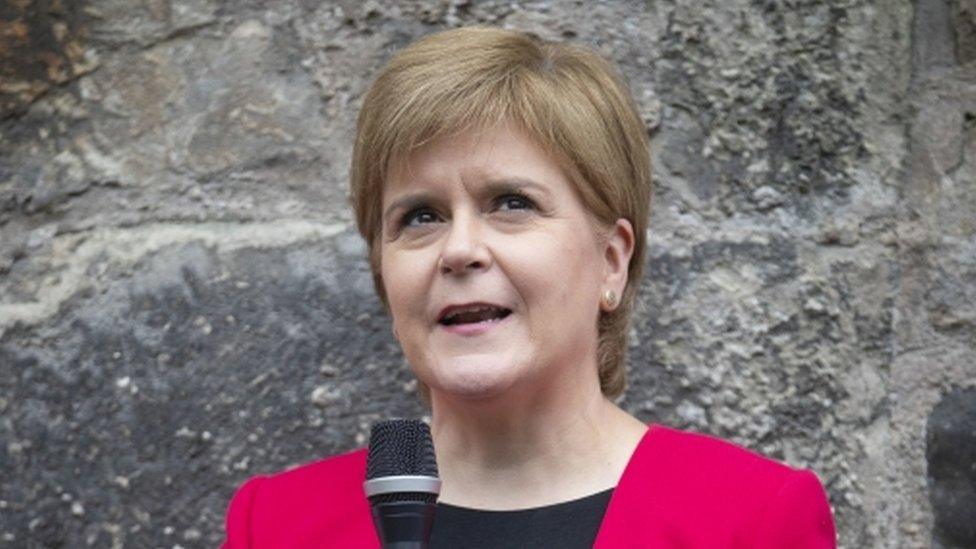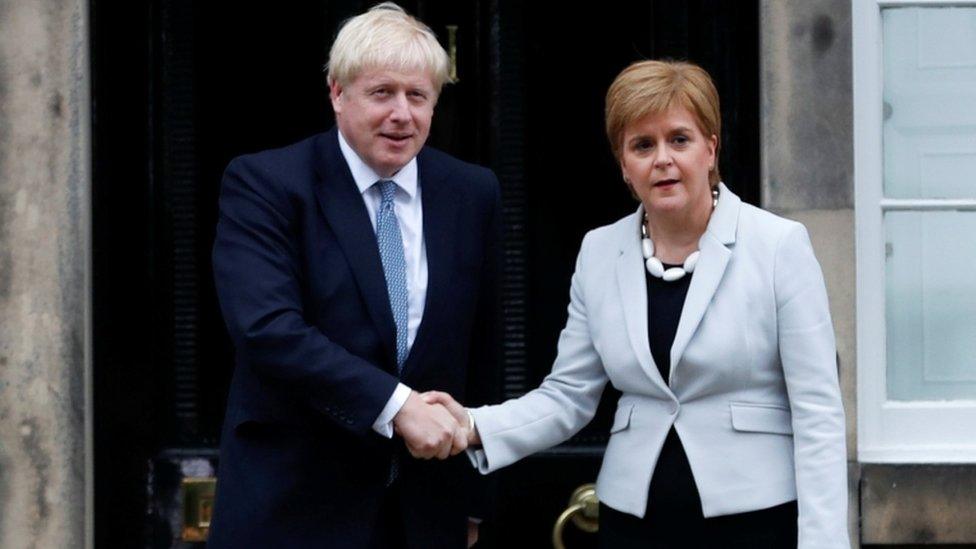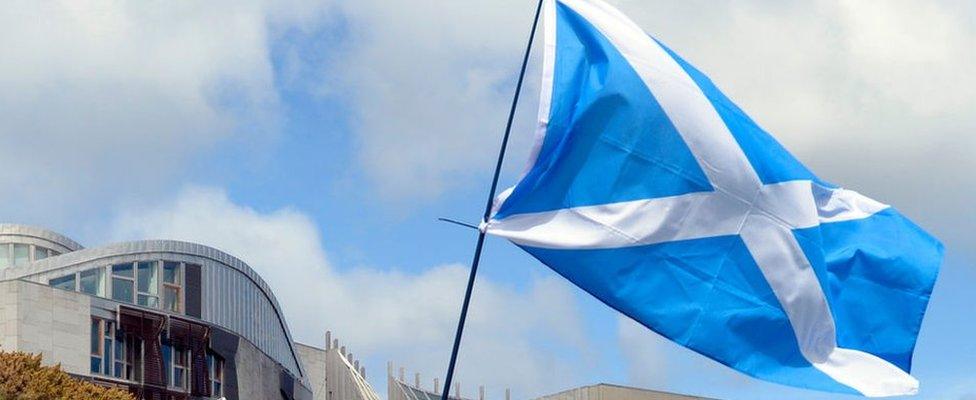Nicola Sturgeon points to 'growing urgency' for Scottish independence
- Published
- comments

Nicola Sturgeon has been reacting to a new poll suggesting a majority would back independence for Scotland
Nicola Sturgeon said there was "growing urgency" for Scotland to become independent "sooner rather than later".
The first minister believed the country faced being "dragged down a political path we don't want to go" because of Brexit and with Boris Johnson as PM.
Ms Sturgeon was speaking after an opinion poll suggested a majority of Scots could back independence.
However, opposition parties said another vote would be "divisive" and was "not the way forward".
Ms Sturgeon wants to hold a referendum in the second half of 2020, but has said her preferred timetable could be accelerated in light of developments around Brexit, particularly if the UK leaves the EU without a deal.
On Monday, the poll by Lord Ashcroft, external put independence in the lead, with 46% saying they would vote for it and 43% saying they would oppose it.
Excluding those who said they did not know how they would vote, it would give the Yes side a lead of 52% to 48%.
Discussing the poll at an Edinburgh Festival event, Ms Sturgeon said she was confident that opinion was swinging behind her side.
She told her host, LBC presenter Iain Dale: "I think there is growing support for independence in Scotland and I think there is, accompanying that, a growing sense of urgency that if we don't want to get dragged down a path, and I'm not just talking about Brexit here although largely that's what I mean, but dragged down a sort of political path that we don't want to go down, then we need to consider becoming independent sooner rather than later.
"Anecdotally, I have been detecting that shift that's shown up in the Ashcroft poll for quite some time now and I think we are now starting to see that manifest itself in the opinion polls."

Nicola Sturgeon said Boris Johnson should be "dogged" by the question of whether he will agree to indyref2
Ms Sturgeon has put forward "framework" legislation which could pave the way for a second independence referendum.
However, she is holding off on the next step in the process until there has been time for MSPs to "debate the issue further".
UK government ministers have repeatedly said a deal will not be forthcoming, with Mr Johnson insisting the 2014 vote was a "once in a generation" event.
Ms Sturgeon said the only path to independence was via a "legitimate, recognised referendum", adding that the UK government should be under pressure to agree to one.
She said: "It's absolutely legitimate to oppose independence, but - particularly when we see polls where a majority want a referendum and want independence - it's not acceptable democratically to say you'll block the right of people in Scotland to choose.
"Frankly they should be getting dogged by that question. What on earth do you think is remotely democratically acceptable in that? I think it's a position that's unsustainable."

The independence question 'is on a knife edge'
By Sir John Curtice, professor of politics at Strathclyde University

Legislation which could pave the way for a fresh referendum has been tabled at Holyrood
I think what's really interesting here is that it looks as though this poll is further evidence that this swing in favour of Yes appears to be occurring, in particular, among remain voters. And to that extent at least this movement - such as it is - does seem to be tied up with attitudes towards Brexit.
So, if you look at the average of the polls done in the second half of last year, among Remain voters, basically they split 50-50 - 47% said they'd vote Yes, 47% said they'd vote No.
Now, in Lord Ashcroft's poll we have 54% of Remain voters saying they'd vote Yes and only 37% saying they'd vote No. If you do the equivalent analysis among those who voted to leave, you do not find any change in support for independence at all.
There were already signs in the polling before Boris Johnson became prime minister that Remain voters were beginning to swing in the Yes direction. This poll seems to confirm that that indeed is going on, and perhaps it's gone a little bit further.
That said - this is a very close result, it is only one poll and if indeed the true position is that perhaps Scotland is split pretty close to 50-50, we are going to get the occasional poll saying the majority are in favour, and we are going to get the occasional poll saying there's a majority against.
The message still has to be that the question of independence is on a knife edge but the message to London has to be that it is indeed on a knife edge.

The Ashcroft poll, which surveyed 1,019 people between 30 July and 2 August, also suggested that a majority of Scots believed the UK's departure from the EU "strengthens the case for Scottish independence".
Pressed by Mr Dale on why she was "in favour of leaving one union but not another one", Ms Sturgeon insisted that there were clear differences between the independence campaign and Brexit.
She said: "The union that is the UK and the European Union are not the same. Every member state of the EU is an independent country. If being in the EU was inconsistent with being independent, then you'd have to argue that Germany and France and Spain and Portugal aren't independent.
"You choose as an independent country in an interdependent internationalist world, you choose to pool sovereignty.
"Independence for Scotland is not an argument for isolation and turning our backs. That's why most people in Scotland oppose Brexit - we don't want to turn our backs on Europe or the rest of the world, we want to play a bigger role there, pool sovereignty and work with others where it's in our mutual interest."
'Chaotic situation'
A spokesman for the Scottish Conservatives said another referendum would be "divisive" and that the party would "oppose it every step of the way".
He added: "It is time for us all to focus on what matters - growing our economy, and sorting out the mess the SNP is making of our education system and the NHS."
Scottish Lib Dem leader Willie Rennie meanwhile blamed the Conservatives for the "apparent rise in support for independence", saying the party was "playing fast and loose with the future of our country".
He said: "Some people seem to be tempted by independence to escape Brexit and the Conservatives cannot be trusted to win them back.
"Boris Johnson's reckless pursuit of a no deal Brexit has caused great anxiety even though independence would add more chaos onto an already chaotic situation."